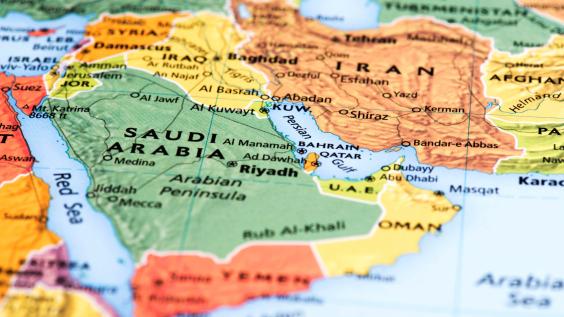The U.S.-Saudi Relationship: Ripe for Improvement

Table of Contents
Author(s)
Share this Publication
- Download PDF
- Print This Publication
- Cite This Publication Copy Citation
Krane, Jim. 2016. The U.S.-Saudi Relationship: Ripe for Improvement. Policy Brief: Recommendations for the New Administration. Rice University’s Baker Institute for Public Policy, Houston, Texas.
The U.S. Saudi relationship has faltered under the Obama administration, accelerating a long-running deterioration since the end of the Cold War when the partnership lost much of its strategic rationale. Some observers argue that America should now step further away, given the newfound bounty of U.S. shale oil. But Saudi Arabia is an increasingly important player in a complexifying Middle East. The kingdom is also the largest supplier in an oil market that is being altered by climate change.
Given America’s keen interest in these areas, the incoming president should work to rebuild ties with Riyadh. An increase in American support would incentivize the kingdom to place more importance on U.S. goals, and might reverse the emerging trend—since King Salman’s accession in 2015—for Saudi actions that run contrary to U.S. interests. Even modest American efforts can be effective. Saudi Arabia is more eager to cooperate with the United States than the reverse. Barring an unforeseen event, the kingdom does not have to be on the list of knotty issues facing President Trump.
Critical Voices
President Trump will hear that the kingdom operates at cross-purposes to American values on women, religious tolerance, democracy, and terrorism. Critics argue that increased U.S. oil production frees America from dependence on Saudi crude and the need to paper over our differences. Why spend upwards of what O’Hanlon estimates at $50 billion per year to protect Saudi Arabia (and the Gulf monarchies) when the kingdom shares few of our values?
Some of the kingdom’s fiercest critics are in the U.S. Congress. Congress’ recent law allowing 9/11 families to sue the kingdom—overriding Obama’s veto—exacerbated the estrangement.
Saudi Retorts
From the Saudi perspective, the grievances are more manifold, but the options fewer. Riyadh views the Obama administration as compounding the errors of the George W. Bush years, when America invaded Iraq and allowed an Iran-dominated government to steer the country into Tehran’s orbit.
Since then, Obama has pulled U.S. troops out of Iraq and Afghanistan, reduced the U.S. Navy presence in the Persian Gulf, reneged on a threat to strike Syria, encouraged revolutionaries in Tunisia and Egypt, and, most worryingly, concluded a deal with Iran, the Saudi arch-nemesis.
For the kingdom, the Iran nuclear deal portends a broader U.S.-Iran reconciliation, which comes amid Iranian ascendance in Iraq, Yemen, Syria, and Lebanon. Still, the kingdom has few options for external protection for itself and its oil shipments, which mainly flow to Asia. Even if America wanted to give up the role, China isn’t ready to accept it. An alliance with Russia would be unwise. For now, Washington is the sole option.
Reasons for a Rapprochement
Despite the differences, the U.S.-Saudi friendship retains value.
Saudi spare oil production capacity has been a strategic asset for the importing world. The kingdom’s ability to offset outages has calmed markets and prevented price spikes. But Saudi spare capacity has shrunk. The incoming president should reiterate America’s interest in the kingdom’s ability to cover supply shocks.
Further, American firms are consistent winners in the kingdom’s capital projects market. Saudi students have flocked to U.S. universities, which increases American “soft power” inside the kingdom. American friendship even comes with a small level of influence within OPEC.
On security, cooperation remains strong. Although the Saudis have lost interest in U.S. goals in Syria and have instead confronted what they see as Iranian meddling in Yemen, Saudi leaders appear willing to make concessions.
Saudi cooperation on ISIS, Syria, and Yemen could probably be improved by U.S. reassurance on its “security umbrella” and perhaps an increase in intelligence and military ties.
Iran
America and Saudi Arabia will continue to disagree over Iran, although the Saudis at least went through the motions of supporting the 2015 Iranian nuclear deal.
Ultimately, Riyadh will accept that the U.S. and Iran share common goals in Afghanistan and Iraq, where ISIS threatens Iranian interests even more than ours. At the same time, we should reinforce support for a united Iraqi military under centralized control and disbanding of sectarian militias.
As long as Iran cooperates on the nuclear front, the incoming U.S. president should make clear to Riyadh—and Congress—that Washington will not block Iran’s return to the international fold.
Human Rights
A Saudi Arabia outside the U.S. orbit has demonstrated the ability to become a disruptive force. Had America maintained stronger ties, it might have been able to coax the kingdom back from the brutal bombing of Yemen, which—besides killing civilians—has created operating space for al-Qaida. The kingdom’s 2016 execution of Shia cleric Nimr al-Nimr may well have gone ahead in the face of Washington’s protests because of the deteriorating relationship. Stronger ties allow America to push back against maltreatment of Saudi Shia.
The kingdom’s treatment of women remains a hurdle. Grandstanding by U.S. politicians on the issue of women driving has made the Saudi ban harder to overturn. Would-be reformers face accusations of caving in to American pressure. These concerns are more effectively voiced in private.
Climate
Climate change poses an urgent area for U.S.-Saudi cooperation. Saudi Arabia remains economically dependent on oil exports and politically dependent on energy subsidies. Both undermine the kingdom’s stability and that of the global climate.
An economically diversified Saudi kingdom would present a stronger ally, and would have less reason to oppose climate action. Reforming fossil fuel subsidies would reduce the kingdom’s unsustainable energy demand and carbon footprint, while preserving oil for more valuable use.
The kingdom is making progress on both fronts. It raised energy prices in January 2016 and promises to continue price increases for five years. Its diversification into petrochemicals presents a “future proofed” way to monetize oil without burning it. A Saudi Aramco IPO would further the diversification agenda.
Climate cooperation also matters because Saudi Arabia is on the climate front line. Summer temperatures exacerbated by the greenhouse effect are breaking records and reaching the limits of human tolerance.
Conclusion
In short, despite many differences, the United States and Saudi Arabia maintain important mutual interests. The chaos enveloping parts of the Middle East underlines the kingdom’s need to retain American hard security. With modest effort, the incoming president can improve U.S. influence with this important regional powerhouse.
This material may be quoted or reproduced without prior permission, provided appropriate credit is given to the author and Rice University’s Baker Institute for Public Policy. The views expressed herein are those of the individual author(s), and do not necessarily represent the views of Rice University’s Baker Institute for Public Policy.



